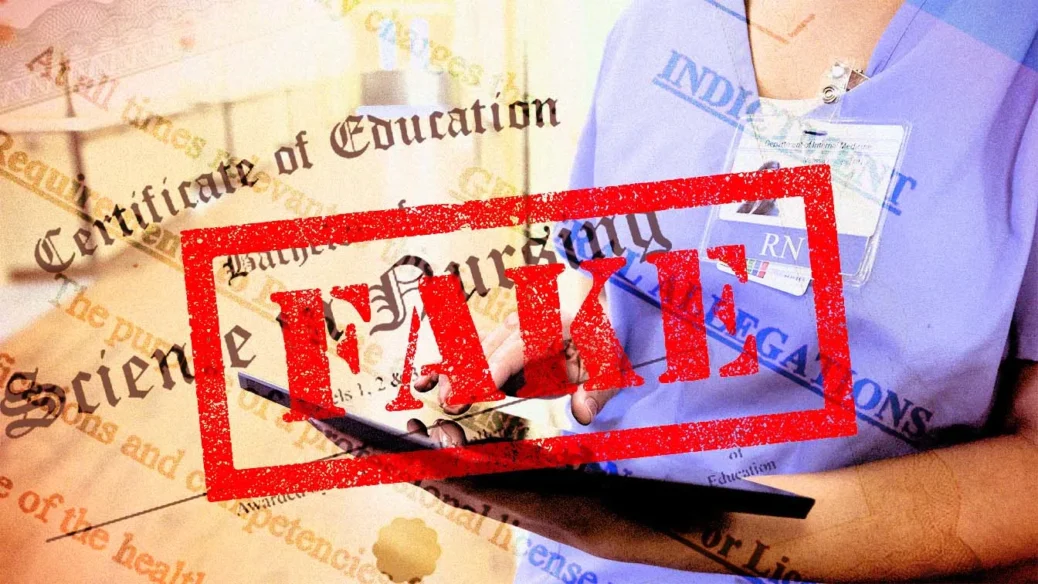Fake nursing degrees have become a growing concern in the healthcare industry. The demand for qualified nurses has increased, leading some individuals to falsify their credentials in order to obtain employment. This has resulted in a number of negative consequences for both the healthcare system and patients.
One of the main issues with fake nursing degrees is the lack of proper training and education. Nurses with fraudulent degrees may not have the necessary knowledge or skills to provide adequate care to patients. This can lead to medical errors, misdiagnosis, and other serious consequences. Additionally, these nurses may not have undergone the same rigorous background checks and screenings as legitimate nurses, putting patients at risk of harm.
The Rise of Fake Nursing Degrees
Nursing is a highly respected profession that requires extensive training and education. Unfortunately, the rise of fake nursing degrees has become a growing problem in recent years. These fake degrees not only deceive aspiring nurses but also put patients’ lives at risk.
Prevalence of Diploma Mills
Diploma mills are institutions that offer degrees without requiring any actual coursework or education. These institutions are known for providing fake degrees to students who are willing to pay for them. Diploma mills are prevalent in the field of nursing, and many students have fallen victim to their scams.
Diploma mills often advertise their programs as a fast and easy way to obtain a nursing degree. They offer online courses that can be completed in a matter of weeks or months, and they promise to provide students with a degree that is equivalent to one obtained from a reputable institution.
Online Scams and Fraudulent Institutions
The rise of the internet has made it easier for scammers to deceive people. Many fraudulent institutions offer online nursing programs that are not accredited or recognized by any legitimate nursing organization. These institutions often charge exorbitant fees for their programs and promise students that they will be able to obtain a nursing degree quickly and easily.
Aspiring nurses who fall victim to these scams often end up with a degree that is worthless and cannot be used to obtain a nursing license. They may also face legal consequences if they attempt to practice nursing without a valid license.
In conclusion, the rise of fake nursing degrees is a serious problem that needs to be addressed. Aspiring nurses must be diligent in their research and ensure that they are obtaining their degrees from accredited and reputable institutions. Employers and nursing organizations must also take steps to verify the credentials of their employees and members to prevent fake degrees from infiltrating the nursing profession.
Legal and Ethical Implications
Consequences for Fraudulent Nurses
Nurses who obtain fake nursing degrees face serious legal and ethical consequences. They risk losing their nursing license, being fined, and even facing criminal charges. Patients may also sue fraudulent nurses for malpractice, which can result in significant financial damages and legal fees.
Additionally, fraudulent nurses may face disciplinary action from their employer, which can include termination and difficulty finding future employment. The consequences for obtaining a fake nursing degree can have a lasting impact on the nurse’s career and reputation.

Impact on Healthcare Systems
Fake nursing degrees can have a significant impact on healthcare systems. Patients rely on nurses to provide high-quality care, and fraudulent nurses may not have the necessary knowledge and skills to provide safe and effective care. This can lead to medical errors, patient harm, and negative outcomes.
Furthermore, healthcare systems may face legal and financial repercussions if fraudulent nurses are employed. They risk losing their accreditation and reputation, which can affect their ability to attract and retain patients and staff.
Regulatory Responses
Regulatory bodies have responded to the issue of fake nursing degrees by implementing stricter requirements for nursing education and licensure. They have also increased their efforts to detect and investigate fraudulent degrees, including partnering with law enforcement agencies.
In addition, some states have passed laws that criminalize the use of fake nursing degrees. These regulatory responses aim to protect patients and maintain the integrity of the nursing profession.

Investigations and Crackdowns
Governmental Actions
In recent years, several governments have taken action to crack down on fake nursing degrees and the professionals who hold them. This has included investigations into individuals and institutions that have been found to be involved in the production and distribution of fake nursing degrees.
One such example is the case of a group of individuals in the United States who were found to be selling fake nursing degrees online. The individuals were investigated by the FBI and were eventually charged with fraud and conspiracy to commit wire fraud.
Other governments have taken similar actions, including the governments of Canada and the United Kingdom. In Canada, for example, the government has established a task force to investigate the issue of fake nursing degrees and to develop strategies to combat the problem.
Educational Accreditation Bodies
Educational accreditation bodies have also taken action to address the issue of fake nursing degrees. These bodies are responsible for ensuring that educational institutions meet certain standards and that the degrees they award are legitimate.
One example of an educational accreditation body that has taken action is the Accreditation Commission for Education in Nursing (ACEN) in the United States. The ACEN has established a process for investigating complaints about institutions that award fake nursing degrees and has taken action against institutions that have been found to be involved in such activities.
Overall, the actions taken by governments and educational accreditation bodies have helped to reduce the prevalence of fake nursing degrees and to ensure that the nursing profession is populated by qualified and legitimate professionals.
Real Cases and Outcomes
Prosecuted Cases
There have been several cases of individuals who have been caught with fake nursing degrees and prosecuted for their actions. In one case, a woman was charged with forgery and theft after it was discovered that she had used a fake nursing degree to obtain a job at a hospital. She was sentenced to two years in prison and ordered to pay restitution to the hospital.
Another case involved a man who had been working as a nurse for several years before it was discovered that he had a fake nursing degree. He was charged with fraud and sentenced to five years in prison. He also lost his nursing license and was ordered to pay restitution to the hospital where he had worked.
Professional Repercussions
In addition to legal consequences, individuals who use fake nursing degrees face professional repercussions. They may lose their nursing license and be barred from working in the healthcare industry. This can have a significant impact on their future job prospects and earning potential.
Employers may also face consequences for hiring individuals with fake nursing degrees. They may be subject to fines and legal action, and their reputation may be damaged as a result of the incident.
Overall, the use of fake nursing degrees is a serious issue that can have far-reaching consequences for both individuals and employers. It is important for healthcare organizations to have robust screening processes in place to prevent individuals with fake degrees from entering the profession.
Preventive Measures and Public Awareness
Educational Campaigns
To prevent the proliferation of fake nursing degrees, educational campaigns are necessary to inform the public about the risks of hiring unqualified nurses. These campaigns can be conducted by government agencies, professional associations, and educational institutions to educate the public about the importance of verifying the credentials of nurses.
Strengthening Verification Processes
To prevent the issuance of fake nursing degrees, verification processes should be strengthened. Educational institutions should implement more rigorous procedures for verifying the authenticity of degrees and transcripts. Government agencies should also establish better communication channels to share information about fraudulent activities in the nursing profession.
In addition, employers should also take an active role in verifying the credentials of their employees. They should conduct background checks and ensure that their employees have valid nursing licenses. By taking these steps, employers can help prevent the hiring of unqualified nurses and protect the public from harm.
Overall, preventive measures and public awareness are crucial for combating the problem of fake nursing degrees. By educating the public and strengthening verification processes, we can ensure that only qualified nurses are providing care to patients.








